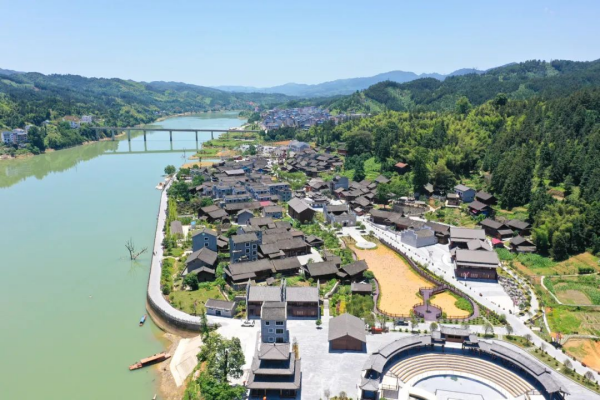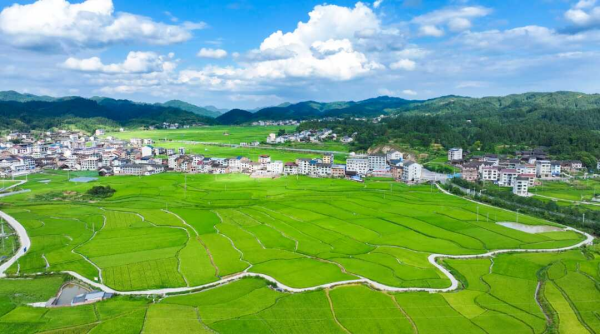- Profile Jurisdictions GOV DEPARTMENTS Cultures Travelling Educate
-
Tianzhou County is located in the southeastern part of Guizhou Province, with a total area of 2,201 square kilometers. It administers 11 towns, 4 sub-districts, and 2 townships, comprising 134 administrative villages (residents' committees and communities). The registered population is 419,700. It is renowned as the “Golden City of the Guizhou Plateau,” “China's Barite Capital,” and China's Hometown of Ornamental Stones." It has been honored with over 20 awards, including the National Forest-Based Economy Poverty Alleviation Pilot Zone, National Forest-Based Economy and Green Industry Demonstration Base, and Provincial Forest City.

Tianzhu enjoys a unique geographical advantage. It borders Xinhuang, Zhiang, Huitong, and Jingzhou in Hunan Province, as well as Jianhe, Sansui, and Jinping in Guizhou Province. It serves as an important gateway connecting Sichuan, Chongqing, and Guizhou with Guangdong, Guangxi, Jiangsu, and Zhejiang, earning it the title of “The First Gateway of Eastern Guizhou”; As an important passageway for eastward access to Hunan and Hubei provinces and southward access to Guangdong and Guangxi provinces, the county seat is 69 kilometers from the Shanghai-Kunming High-Speed Railway, 145 kilometers from the Hunan railway hub city of Huaihua, and 66 kilometers and 120 kilometers from Liping Airport and Zhi Jiang Airport, respectively. The Sanli Expressway runs through the county, and the Tianzhou-Huitong and Tianzhou-Dalong expressways have been included in the national “14th Five-Year Plan” highway network plan. The planned construction of the Qingjiang River high-grade waterway will enable access to Dongting Lake and the Yangtze River, with a comprehensive water and land transportation network gradually taking shape.
Tianzhou's economy is thriving. Fully leveraging its resource endowment advantages, the county possesses over 10 major mineral resources including barite, gold, coal, and iron ore. Proven reserves include 178 million tons of barite and 200 tons of gold, with potential barite reserves exceeding 300 million tons, accounting for over 70% of the national total. In 2024, Tianzhou County's GDP reached 9.8 billion yuan.

Tianzhou boasts favorable agricultural and forestry conditions. Located in the subtropical monsoon climate zone, the county has distinct seasons and abundant rainfall. It has two large reservoirs spanning over 10,000 acres, three reservoirs over 5,000 acres, and six reservoirs over 1,000 acres. It is an important grain-producing region in Guizhou Province, with specialty industries such as free-range chickens, mules, tea oil, traditional Chinese medicine, premium fruits and vegetables, and tobacco. “Tianzhu Tea Oil,” “Tianzhu Mule,” Tianzhu Tobacco" have been included in the national list of protected agricultural products. Tianzhu County has a forest coverage rate of 67.39%, with 502,000 mu of available forest land for development. It is a national demonstration base for oil tea forests, the largest county in Guizhou Province for wood-based oilseed resources, and an important forestry base county in Guizhou Province. Industries such as forest-based ecological chickens, forest herbs, and forest bees are thriving.
Tianzhu County has a rich cultural heritage. Known as the “County of Culture and Education,” Tianzhu County hired teachers to establish schools during the Ming Dynasty's Wanli reign, nurturing prominent figures such as Song Renpu, the first Miao ethnic group scholar in Guizhou Province's history during the Qing Dynasty, the renowned general Wang Tianpei, and the anti-Japanese general Wu Shaozhou. It has also produced a large number of renowned writers, painters, musicians, and other artists such as Zhang Zuowei, Yang Changhuai, Yang Shaolü, and other renowned writers, painters, musicians, and artists. It was the first county in Guizhou Province to eliminate illiteracy and the second to have two provincial-level示范 high schools. It has successfully passed the national assessment for the basic balanced development of compulsory education. The Miao-Dong culture of the Qingjiang River basin, along with Central Plains culture and Jingchu culture, has nurtured and shaped the unique humanistic style of Tianzhou.

Tianzhou is rich in cultural and tourism resources. Its scenic landscapes, rich cultural heritage, and superior ecological environment make it a Miao-Dong ethnic tourism zone. The Sanmen塘 Minority Ancestral Hall Culture and Baotang Ethnic Culture fully embody the essence of Miao-Dong culture, with over 100 ancestral halls still well-preserved, making it a treasure trove of ancestral hall culture in southwest China; the “48 Villages Song Festival” has been listed on the national intangible cultural heritage list; The Qing Shui River flows through the area, with islands and islets dotted along its course, earning it the nickname “Qing Shui River Hundred-Mile Scenic Corridor.” The mysterious “Kung Fu Village” Ganxi Dong Village and the “China's Most Beautiful Rural Tourism Village” Diliang attract countless visitors seeking exploration. The diverse archaeological culture, timber merchant culture, ancestral hall culture, village culture, folk customs culture, and奇石 culture together form a distinctive tourism, leisure, and wellness destination.
contact details
Tel:00-86-0855—7522448
Address:No. 18 Zhengzhong Street, Fengcheng Subdistrict, Tianzhou County
Working hours:8:30 AM – 12:00 PM, 2:00 PM – 5:30 PM (excluding statutory holidays)
